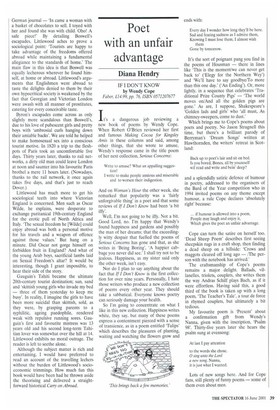Poet with an unfair advantage
Diana Hendry
IF I DON'T KNOW by Wendy Cope Faber, £14.99, pp. 76, ISBN 0571207677 It's a dangerous job reviewing a new book of poems by Wendy Cope. When Robert O'Brien reviewed her first and famous Making Cocoa for Kingsley Amis in these columns and said, among other things, that she wrote to amuse, Wendy's response came in the title poem of her next collection, Serious Concerns:
Write to amuse? What an appalling suggestion!
I write to make people anxious and miserable and to worsen their indigestion.
And on Woman's Hour the other week, she remarked that popularity was a 'fairly unforgivable thing' in a poet and that some reviews of If I Don't Know had been 'a bit iffy'.
Well, I'm not going to be iffy. Not a bit. Good Lord, no. I'm happy that Wendy's found happiness and gardens and possibly the man of her dreams; that the exceedingly witty despair that fuelled the poems of Serious Concerns has gone and that, as she writes in 'Being Boring', 'A happier cabbage you never did see.' I shall try not to be jealous. Happiness, as my sister said only the other week, isn't easy.
Nor do I plan to say anything about the fact that If! Don't Know is the first collection for over nine years. Personally, I hate those writers who produce a new collection of poems every other year. They should take a sabbatical. Everyone knows poetry can seriously damage your health.
So I'm going to concentrate on what I like in this new collection. Happiness writes white, they say, but many of these poems express a contentment pierced with a sense of transience, as in a poem entitled 'Tulips' which describes the pleasures of planting, waiting and watching the flowers grow and
Every day I wonder how long they'll be here. Sad and fearing sadness as I admire them, Knowing I must lose them. I almost wish
them Gone by tomorrow.
It's the sort of poignant pang you find in the poems of Housman — there in lines like 'This is the moment/we can never get back to' (`Elegy for the Northern Wey') and 'We'll have to say goodbye/To more than this one day.' ('An Ending'). Or, more lightly, in a sequence that celebrates 'Traditional Prize County Pigs' — 'The world moves on/And all the golden pigs are gone.' As are, I suppose, Shakespeare's 'Golden lads and girls' who 'all must, As chimney-sweepers, come to dust.'
Which brings me to Cope's poems about poets and poetry. No Jason Strugnell this time, but there's a brilliant parody of Berryman's 'Dream Songs' written at Hawthornden, the writers' retreat in Scotland:
Back up to poet's lair and sit on bed. Is you bored, Bones, all by youzeself wif read and write and bein' deep?
and a splendidly satiric defence of humour in poetry, addressed to the organisers of the Bard of the Year competition who in 1994 invited poems on any theme except humour, a rule Cope declares 'absolutely right' because:
... if humour is allowed into a poem, People may laugh and enjoy it, Which gives the poet an unfair advantage.
Cope can turn the satire on herself too. 'Dead Sheep Poem' describes first seeing sheepskin rugs in a craft shop, then finding a dead sheep on a hillside: 'Crows and maggots cleared off long ago — The person with the notebook has arrived.'
The craftsmanship of Cope's poems remains a major delight. Ballads, villanelles, triolets, couplets, she writes them the way Andras Schiff plays Bach, as if it were effortless. Having said this, a good third of the book is taken up with a long poem, 'The Teacher's Tale', a tour de force in rhymed couplets, but ultimately a bit tedious.
My favourite poem is 'Present' about a confirmation gift from Wendy's Nanna, given with the inscription, 'Psalm 98'. Thirty-five years later she hears the psalm sung at evensong:
At last I pay attention
to the words she chose. 0 sing unto the Lord a new song. Nanna, it is just what I wanted.
Lots of new songs here. And for Cope fans, still plenty of funny poems — some of them even about men.


































































 Previous page
Previous page